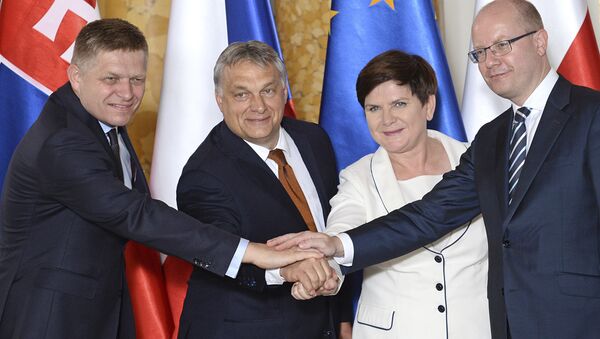Sputnik: How much power do member states have over the proposed EU budget?
Mariann Őry: All the member states have to agree to the final budget, so if one member state doesn’t agree, then it won’t happen in that way. Obviously, different member states obviously have different lobbying powers, and for the Hungarian government it is very important to reach a common decision with the Visegrád’s four countries. Obviously, four countries have more lobbying power than just one country.
Sputnik: Well, for sure. I mean he [Viktor Orban] has been very vociferous in certain elements of strategy with the EU. In your view, is it fair that poor countries of the European Union have to pay equal share with the richest countries for their migration policy? On the face of it, it doesn’t sound fair to me.
Mariann Őry: No, no. Well, Eastern European and Central European countries including Hungary certainly don’t agree with this idea that these countries should pay for the migration policies of Western European countries. I’m fairly sure the Visegrád four countries won’t agree with them, because there are some elements of this EU budget, which make the impression that they are made specifically to punish these countries, the Visegrád four countries, which have a different opinion on migration, and I don’t think that the EU should expect these countries to agree with that.
Sputnik: What’s the general feeling in the street in Hungary and maybe the south? So you agree with Viktor Orban’s stance that "not a single cent," not a single penny or euro should be given to migrants from the new EU budget? And why is that?
Mariann Őry: I would say that in Hungary in general we have a consensus about the migration policy, and this is one of the reasons why Fidesz has won a third term with a full third majority, because migration is a topic that most Hungarians agree on, even beyond the traditional base of Fidesz. The majority agree with the strict migration policy.
Sputnik: How much public support does Viktor Orban’s stance on migration have in Hungary? Was it one of the leading elements of his recent victory in the parliamentary elections that were held last month? What was the key factor that the majority of the population in Hungary voted for him for?
Mariann Őry: It was a very important factor indeed, not the only factor, because many people voted for Fidesz and voted for Viktor Orban for stability. And there are a number of welfare packages, and a number of reasons why Fidesz has large public support, but migration was generally a very important topic in the campaign. We have also seen it in the referendum against the mandatory quota, when the government’s opinion got more support than the usual voter base of Fidesz. So, we can say that the agreement about migration goes beyond party lines.
Sputnik: What about Viktor Orban’s leadership of the last few years, what effect has it actually had in real terms of quality of life? Because he has had actually brought real growth to the country and since its inception into the European Union. Do people sense that the quality of life has improved under Viktor Orban?
Mariann Őry: Well, the economy is doing good. The wages are rising, obviously we are not at the same level yet as Western European countries, but the whole region is not at the same level, so it’s a normal thing. But wages are going up, unemployment is going down. There are several aspects to it which can’t only be seen in statistics and numbers, there are some aspects that can be actually felt by the people.
The views and opinions expressed by Mariann Őry are those of the speaker and do not necessarily reflect Sputnik's position.





